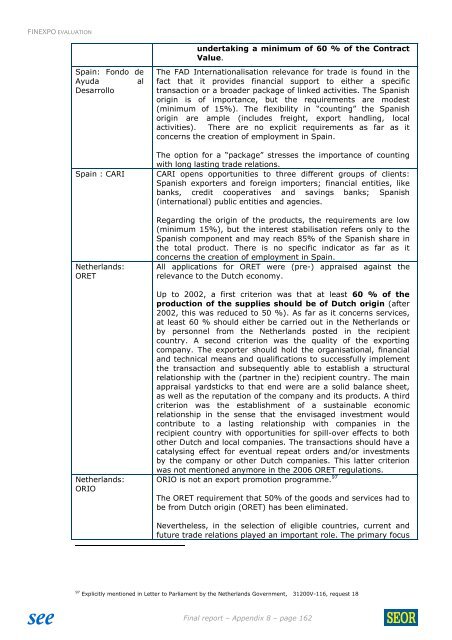Evaluatierapport (PDF, 6.47 MB) - Buitenlandse Zaken - Belgium
Evaluatierapport (PDF, 6.47 MB) - Buitenlandse Zaken - Belgium
Evaluatierapport (PDF, 6.47 MB) - Buitenlandse Zaken - Belgium
You also want an ePaper? Increase the reach of your titles
YUMPU automatically turns print PDFs into web optimized ePapers that Google loves.
FINEXPO EVALUATION<br />
undertaking a minimum of 60 % of the Contract<br />
Value.<br />
Spain: Fondo de<br />
Ayuda<br />
al<br />
Desarrollo<br />
Spain : CARI<br />
Netherlands:<br />
ORET<br />
Netherlands:<br />
ORIO<br />
The FAD Internationalisation relevance for trade is found in the<br />
fact that it provides financial support to either a specific<br />
transaction or a broader package of linked activities. The Spanish<br />
origin is of importance, but the requirements are modest<br />
(minimum of 15%). The flexibility in “counting” the Spanish<br />
origin are ample (includes freight, export handling, local<br />
activities). There are no explicit requirements as far as it<br />
concerns the creation of employment in Spain.<br />
The option for a “package” stresses the importance of counting<br />
with long lasting trade relations.<br />
CARI opens opportunities to three different groups of clients:<br />
Spanish exporters and foreign importers; financial entities, like<br />
banks, credit cooperatives and savings banks; Spanish<br />
(international) public entities and agencies.<br />
Regarding the origin of the products, the requirements are low<br />
(minimum 15%), but the interest stabilisation refers only to the<br />
Spanish component and may reach 85% of the Spanish share in<br />
the total product. There is no specific indicator as far as it<br />
concerns the creation of employment in Spain.<br />
All applications for ORET were (pre-) appraised against the<br />
relevance to the Dutch economy.<br />
Up to 2002, a first criterion was that at least 60 % of the<br />
production of the supplies should be of Dutch origin (after<br />
2002, this was reduced to 50 %). As far as it concerns services,<br />
at least 60 % should either be carried out in the Netherlands or<br />
by personnel from the Netherlands posted in the recipient<br />
country. A second criterion was the quality of the exporting<br />
company. The exporter should hold the organisational, financial<br />
and technical means and qualifications to successfully implement<br />
the transaction and subsequently able to establish a structural<br />
relationship with the (partner in the) recipient country. The main<br />
appraisal yardsticks to that end were are a solid balance sheet,<br />
as well as the reputation of the company and its products. A third<br />
criterion was the establishment of a sustainable economic<br />
relationship in the sense that the envisaged investment would<br />
contribute to a lasting relationship with companies in the<br />
recipient country with opportunities for spill-over effects to both<br />
other Dutch and local companies. The transactions should have a<br />
catalysing effect for eventual repeat orders and/or investments<br />
by the company or other Dutch companies. This latter criterion<br />
was not mentioned anymore in the 2006 ORET regulations.<br />
ORIO is not an export promotion programme. 97<br />
The ORET requirement that 50% of the goods and services had to<br />
be from Dutch origin (ORET) has been eliminated.<br />
Nevertheless, in the selection of eligible countries, current and<br />
future trade relations played an important role. The primary focus<br />
see<br />
97 Explicitly mentioned in Letter to Parliament by the Netherlands Government, 31200V-116, request 18<br />
Final report – Appendix 8 – page 162

















